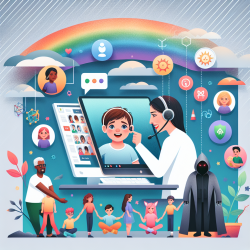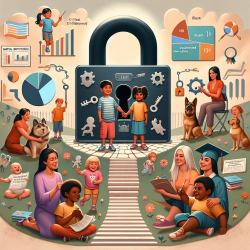Introduction
In the evolving landscape of digital communication, social media platforms like Facebook have become integral to daily life, especially among younger populations. However, these platforms also pose challenges, particularly for vulnerable groups such as LGBT youth. A recent study titled Negative Facebook experiences among Taiwanese gay and bisexual men in emerging adulthood: associations with traditional harassment victimization and quality of life by Lu et al. (2019) sheds light on the prevalence and impact of negative experiences on Facebook among gay and bisexual men in Taiwan. This research provides valuable insights that can be leveraged by practitioners in speech-language pathology and online therapy to improve outcomes for children and adolescents.
Key Findings from the Research
The study found that 26.5% of participants reported significant negative experiences on Facebook in the past year. These experiences were strongly associated with verbal ridicule and relational exclusion, which in turn were linked to lower quality of life (QOL) across various domains, excluding social relationships. This highlights the intricate connection between online experiences and real-life victimization, emphasizing the need for comprehensive approaches in addressing these issues.
Implications for Practitioners
For practitioners working with children and adolescents, especially those in the LGBT community, understanding the impact of social media on mental health and quality of life is crucial. Here are some strategies that can be implemented based on the research findings:
- Awareness and Education: Educate children and their families about the potential risks of social media, including cyberbullying and relational aggression. This can empower them to recognize and report negative experiences.
- Screening and Assessment: Incorporate questions about social media use and experiences into routine assessments. This can help identify children who may be at risk of negative online experiences and require additional support.
- Supportive Interventions: Develop interventions that focus on building resilience and coping strategies. Encourage positive social interactions and provide resources for managing stress and anxiety related to social media use.
- Collaboration with Schools: Work with schools to create safe online environments. This includes implementing anti-bullying policies and providing training for educators on recognizing and addressing cyberbullying.
Encouraging Further Research
While the study provides significant insights, it also highlights the need for further research to explore the nuances of negative online experiences across different populations. Practitioners are encouraged to engage in or support research initiatives that investigate the long-term effects of social media on mental health and quality of life. This can lead to the development of more targeted interventions and policies that promote the well-being of children and adolescents.
Conclusion
The findings from Lu et al.'s study underscore the importance of addressing negative online experiences in therapeutic settings. By integrating these insights into practice, speech-language pathologists and online therapists can enhance their support for children, particularly those from vulnerable communities. This approach not only improves individual outcomes but also contributes to creating safer and more inclusive online environments.
To read the original research paper, please follow this link: Negative Facebook experiences among Taiwanese gay and bisexual men in emerging adulthood: associations with traditional harassment victimization and quality of life.










